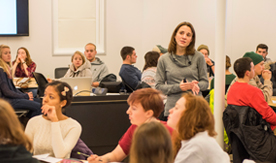
Smith’s Research Hot Topic for ScienceInsider
Top 10 lists are compiled annually — last year there were lists for best books, Seinfeld characters, movies and restaurants. In 2014, an article about a University of Maine professor’s research made a best-read list.
Michelle Smith, assistant professor in the School of Biology and Ecology, co-authored a paper about teaching approaches.
Aleszu Bajak penned “Lectures Aren’t Just Boring, They’re Ineffective, Too, Study Finds,” for ScienceInsider about the research that Smith and others conducted with lead author Scott Freeman of the University of Washington, Seattle. The piece was ScienceInsider’s third most popular of the year, just behind pieces on plagiarism and Ebola.
The researchers re-analyzed 225 studies that compared grades of students enrolled in undergraduate science, engineering and mathematics courses taught in a typical lecture format with the grades of students in STEM courses that utilized active learning methods.
Freeman, Smith and others found students in classes that incorporated active learning techniques were 1.5 times more likely to pass than those in traditional lecture format classes. In addition, they found students in active learning sections earned grades nearly one-half a standard deviation higher, or, for example, a B rather than a B-, than students listening to a lecturer.
The well-read study, “Active learning increases student performance in science, engineering, and mathematics,” was published online in the Proceedings of the National Academy of Sciences of the United States of America.
In Bajak’s ScienceInsider article about the study, Harvard University physicist Eric Mazur was quoted saying the research is important and that “it’s almost unethical to be lecturing if you have this data.”
He continued, “It’s good to see such a cohesive picture emerge from their meta-analysis — an abundance of proof that lecturing is outmoded, outdated, and inefficient.”
Also in December, Smith and Farahad Dastoor, lecturer of biological sciences, were highlighted in a National Science Foundation story titled “Rules of engagement: Transforming the teaching of college-level science.”
Thanks to Smith and Dastoor, 800 UMaine students in three introductory biology sections utilize clickers (response devices) and engage in small group conversations rather than sitting and listening to information dispensed by a “sage on a stage.” Smith “is helping to re-envision science education on her campus as well as across the country,” says the article.
In 2013, Smith became principal investigator on four projects and co-principal investigator on another that were granted $6.8 million in total funding from the National Science Foundation; UMaine’s portion was $1,012,269. The projects are aimed at improving nationwide science instruction and assessments. The studies are collaborative with other universities and involve UMaine administrators, faculty, postdoctoral and graduate students, undergraduates and area K–12 teachers.
Contact: Beth Staples 207.581.3777
